Social Justice Research Initiative Awardees
Running from 2020-2024, the Social Justice Research Initiative was jointly sponsored by the Office of Research and Economic Development; the Office of Community Engagement; the Office of Development and Alumni Affairs; and the Division of Academic Affairs. The awards supported faculty research efforts on social justice such as social stratification, environmental justice, and health disparities.
2023-24 Awardees
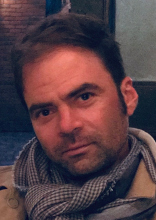
Dr. Thomas Adams
Associate Professor, Department of Integrative Studies
College of Education and Professional Studies
"Accounting for Just Transition: Climate Change and Labor in the Gulf South and Beyond"
Abstract: Accounting for Just Transition seeks to provide the first comprehensive, archivally researched account of just transition's historical development and its original (and oft-forgotten) political theoretic axioms via a scholarly yet broadly accessible monograph and special journal issue. It also seeks to bring labor and environmental groups in the Gulf South around questions of a more effective just transition strategy while seeding a regional research network that can competitively apply for national funding.

Dr. Jordan Albright
Assistant Professor, Department of Psychology
College of Arts and Sciences
"Using a Community-Partnered Approach to Understand and Address Race-based Autism Diagnostic Disparities in Mobile"
Abstract: Autism spectrum disorder is a neurodevelopmental disorder that impacts 1 in 36 children in the United States. Early identification and intervention for this population is critical to improving outcomes for autistic children and their families. Unfortunately, race-based disparities in the timing of diagnosis and access to quality intervention for autism are well documented, with Black children being diagnosed later on average and with higher rates of co-occurring Intellectual Disability. Delays in the diagnosis of autism and the resulting burden of adverse developmental outcomes among Black children represents a significant and persistent race-based health disparity. With this project, we will use a mixed-methods approach to capture stakeholder perspectives about barriers and facilitators to accessing autism diagnostic services in Mobile. We will then partner with a community advisory board to develop a multicomponent toolkit that will overcome identified barriers and facilitate more timely and culturally informed autism diagnostic assessments for Black children in Mobile.

Dr. George Bovenizer
Assistant Professor, Department of Communication
College of Arts and Sciences
"Black Baseball: Breaking the Color Barrier Through Print Media"
Abstract: Years before Jackie Robinson broke Major League Baseball’s color barrier in 1947, the best Black and White players were sharing the same fields, creating bonds, and tearing down racial walls while playing in winter leagues in more tolerant regions of the United States and abroad. This proposed study will further examine media coverage of Black baseball in these more liberal regions on the West Coast and Latin America in the 1930s and 1940s and how it helped accelerate the desegregation of professional baseball.
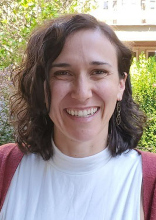
Dr. Meredith Tittler
Assistant Professor, Department of Counseling & Instructional Sciences
College of Education and Professional Studies
"Social Justice Behavioral Measure Validation Study"
Abstract: The development of interventions to increase individuals’ cultural competencies has grown over the years, but the methods with which to assess their effectiveness have not developed at the same rate. We are only aware of one validated measure of social justice behaviors, however this scale is focused on political activism behaviors and thus is not an appropriate outcome measure for cultural competency trainings. The development of interventions will only be as successful as the ability to monitor outcomes. The purpose of the current study is to develop a valid and reliable self-report survey to measure social-justice related behaviors. In addition to attitude change, cultural competency trainings should result in behavioral change, therefore, the development of a valid and reliable behaviorally-focused self-report measure is badly needed to assess the true impact of cultural competency trainings.
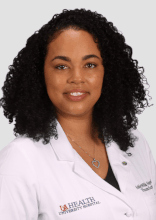
Dr. Ashley Williams
Director, Center for Healthy Communities and Assistant Professor, Department of Surgery
College of Medicine
"Art for Justice: The Story of Gun Violence from a Youth's Perspective"
Abstract: Gun violence is the leading cause of death among youth in the United States, but the burden of gun violence is not evenly distributed throughout society. Young black males are at a significantly increased risk, and communities of color bear the consequences of community gun violence. Project Inspire, launched in 2018, is a partnership between USA Health and Mobile County Juvenile Detention Center, along with other community stakeholders. The goal of this program is to empower youth with nonviolent gun-related offenses to realize their full potential through education, exposure, and mentorship. Project Inspire is a primary prevention strategy that aims to curb gun violence by engaging at-risk youth and addressing their educational and social needs to prevent further victimization and/or gun violence perpetration. The program has been successful with a 5.8% rate of recidivism, compared to 40% among all youth within the county. The most significant risk factor for gun violence is having a history of gun violence. Our participants are at extremely high risk for victimization and perpetration. There have been no previous studies where primary prevention hospital-based violence intervention programs have uplifted the voices of the most vulnerable population through art. Our goal is to utilize various art forms to uplift the voices of vulnerable youth and to use their perspective to inform prevention strategies.
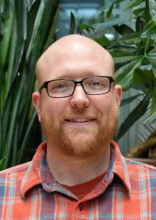
Dr. Benjamin Linzmeier
Assistant Professor, Department of Earth Sciences
College of Arts and Sciences
"Covariation of demographics and soil lead distribution in Mobile, Alabama"
Abstract: Lead exposure has serious health consequences for people across the world. Historical sources like lead paint and leaded gasoline have been eliminated, however because lead does not biodegrade it can accumulate and remain in soils. Work done in other cities across the United States has shown that communities of color are more likely to be exposed to soils with high lead concentrations, but the distribution of lead in soils across Mobile are currently unknown. With this project, we will quantify soil lead distribution using systematic sampling of public parks and participatory sampling from community members. We will then communicate these results to the affected communities and provide information on options for remediation of contaminated soils. Knowledge produced by this work will be empowering to effected communities across Mobile and compliment other public health initiatives.
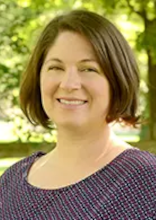
Dr. Erin Nelson
Assistant Professor, Department of Sociology, Anthropology, & Social Work
College of Arts and Sciences
"'Braiding Knowledge' in Mobile Bay: Collaborative Research on Indigenous Art Traditions"
Abstract: The proposed project will support a collaborative partnership between the University of South Alabama, the Choctaw Nation of Oklahoma, the Mississippi Band of Choctaw Indians, and the local art community. Our approach is aligned with what Sonya Atalay (Anishinaabe-Ojibway) calls “braiding knowledge,” which “create[s] space for multiple ways of knowing that complement each other” (Atalay 2020:1). During a week-long workshop, participants will source pottery-making clays that the ancestors of Choctaw people may have used, analyze non-funerary pottery excavated from archaeological sites, replicate pottery from archaeological sites using Choctaw traditional knowledge, and host a public talk and demonstration on Indigenous ceramic traditions and foodways. By “braiding knowledge” from western and Indigenous traditions of art and science, we will examine ancient social networks among potters, reconnect contemporary Choctaw potters with their ancestral homelands, and contribute to the revitalization of Indigenous pottery traditions.
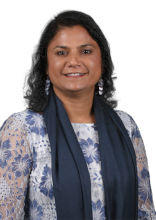
Dr. Seema Singh
Professor, Department of Pathology
College of Medicine and Mitchell Cancer Institute
"Linking social experiences and human biology: a step forward to understanding
health disparities and promoting health equity"
Abstract: Social hardships, including discrimination, segregation, and lesser opportunities, may have an adverse impact on human health and clinical outcomes. We hypothesize that racial background, lifestyle, and unpleasant social experiences significantly influence human biology via perturbation of hormonal and cytokine releases in our blood. To test this hypothesis, we propose to develop unique resources and datasets that can help understand broken homeostasis (physiological imbalance) and link it with race-associated social, behavioral, and economic hardships. The outcome will push for better policies, tailored treatments, disease risk prediction, and the development of improved disease control and prevention strategies to bring social justice and health equities.
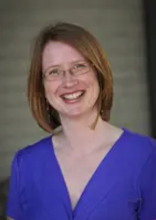
Dr. Susan Gordon-Hickey
Interim Dean
Pat Capps Covey College of Allied Health Professions
"Improving Cultural Competence of Entry Level Allied Health Providers"
Abstract: The goal of this pilot study is to improve the knowledge and attitudes of students enrolled in Allied Health Professions clinical programs with regard to race, racial injustice, social determinants of health in the United States, and implicit bias, in order to positively impact the healthcare delivery and healthcare outcomes for patients served by graduates from the Pat Capps Covey College of Allied Health Professions clinical programs. Students from at least 2 graduate-level Allied Health programs will participate in interprofessional teams. A pre-test/post-test design will be used with an educational intervention. The educational intervention will include reading, lecture, application of acquired knowledge through a standardized patient experience, and reflection activities to encourage reflection on the target knowledge and skills. We aim to expand this to a comprehensive cultural humility program for USA Health Professions students to include topics of race, ethnicity, gender, religion, sexual preference, and socioeconomic status.
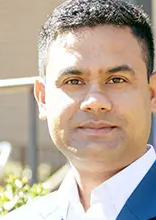
Dr. Delwar Hossain
Associate Professor, Department of Communication
College of Arts and Sciences
"Partisan Media as Enhancers of Belief Gap: The Coverage of the anti-Critical Race Theory (CRT) bills in the Media"
Abstract: Mass media, and social media in particular, have the immense power to create awareness around political issues and enact meaningful changes in a society that has been unjust for Blacks and other minorities for so long. Most recently, cases about Critical Race Theory (CRT) bills have made national news headlines as some states have already passed legislation banning it from classrooms. In addition, anti-CRT bills are before the legislators in some other states (e.g., Alabama). Based on media framing theory and the belief gap model, the purpose of this project is to examine how media frame anti-CRT legislation. We will examine how the media frame anti-CRT bills/legislations. We will review the coverage of at several major media outlets, and will identify the prominent frames used by these outlets in their coverage of issues related to anti-CRT bills. In addition, we will look at the tone of the media coverage (positive, unfavorable, mixed, or neutral).

Dr. Shenghua Wu
Assistant Professor, Department of Civil, Coastal, and Environmental Engineering
College of Engineering
"Fostering A Transformative and Collaborative Learning Community to Promote Social Justice, Equity and Diversity in Engineering Education"
Abstract: The objective of this pilot study is to foster a transformative and collaborative learning community to promote social justice, equity and diversity in engineering education. Specifically, we are aimed at understanding the roles and responsibilities of engineers in promoting social justice, equity, and diversity, identifying the gaps in perceptions among student, faculty, and engineers, exploring the collaborative model that is able to engage college and industrial partner agreeing on measures of success, expectations, and deliverables, and recommending strategies and practices that can integrate social justice, equity and diversity in engineering curriculum, learning environment, and extracurricular activities.
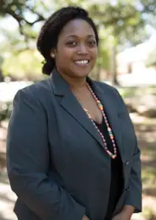
Dr. Charlene Dadzie
Assistant Professor, Department of Marketing & Quantitative Methods
Mitchell College of Business
"Ethnography of Seeing: Transformative Photography for Social Justice in Africatown, U.S.A."
Abstract: Globally, billions of consumers around the globe live in poverty, a state of chronic resource deprivation, lacking access to public social, financial, and healthcare services. Relatedly, industrial, commercial activity in the Gulf Coast region is associated with lower levels of services access for marginalized communities of color and thus higher rates of environmental pollution, toxic dumping, and resultant healthcare disparities. Marketplace exclusion, environmental injustice, racism, and social stratification are some of the key underlying dynamics explaining these phenomena. The current research proposal outlines an ethnographic, transformative photography photovoice project in Africatown, Mobile, AL designed to address how community members and student perspectives can combine to inform the development of community interventions that aim to increase consumption adequacy, promote environmental justice, and mitigate marketplace exclusion (especially as they relate to private and social services).
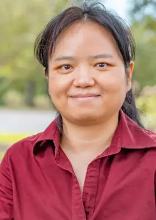
Dr. Shenghua Zha
Assistant Professor, Department of Counseling and Instructional Design
College of Education and Professional Studies
"Building a Positive Learning Experience to Bridge Gender Difference and Advance Middle-Grade Students’ Computational Thinking Skills"
Abstract: We will implement and conduct research on a program that integrates computational thinking (CT) education into middle-grade education. This program aims to offer a positive learning experience for both on-campus and online middle school students and support their learning of CT and the subject content knowledge in two CT-integrated classes in 2021. We will conduct multi-phased mixed-method research to examine the factors of the learning experience and their impact on students’, especially female students’, self-efficacy, performance, and interest in studying computer science. At the end of this program, we will propose an evidence-based CT-integrated curriculum and instructional model that guides the computing education in K-8 education in the U.S.
